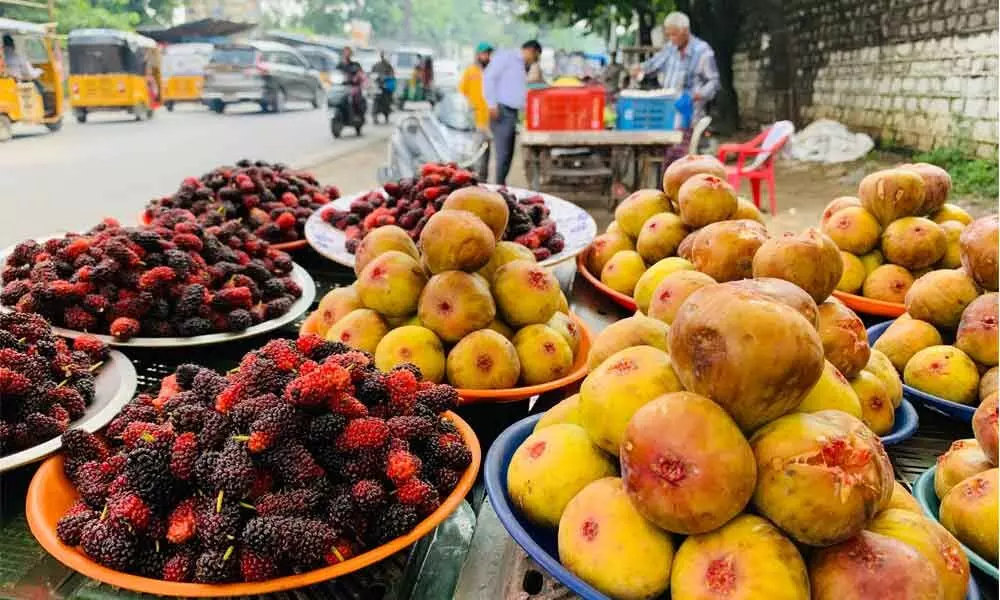Live
- ‘Get Set, Grow Summit 2024’ Focuses on Digital Detox for Families
- Stokes motivates his team to put in extra effort, says England pacer Potts
- From overcoming setbacks to leading India in U19 Women’s Asia Cup, Niki Prasad's amazing journey
- Driving Enterprise Security: Inside Venkata Reddy Thummala’s Leadership Journey
- Constitution debate: PM Modi hails 'Nari Shakti'; makes strong pitch for 'United Bharat’
- Abhijeet Bhardwaj: Revolutionizing Enterprise Analytics with Innovation and Expertise
- Bihar: Inquiry initiated against principal who went to buy veggies during school hours
- Press Sri Lankan Prez for release of Indian fishermen: TN Cong MP to EAM Jaishankar
- TN: DMK postpones executive meet due to heavy rains & Parliament session
- Porous silicon oxide electrodes can fix durability issues in batteries: Researchers
Just In
Hyderabad: Barkas fruits ka koi jawab nahi!


A large number of them are still home-grown and being sold for decades
Hyderabad: Barkas in Old City is home to many Hyderabadis whose forefathers were from Arab nations. The name originated from the word 'barracks,' as the area served as the barracks for Nizam's army. The then army had a large number of Arabs, especially from Yemen. In earlier days, a majority of these families used to grow fruits such as figs, guava, zamrud, mulberries etc., but now-a-days these home-grown fruits culture is slowly withering in Barkas.
Every morning, homegrown fruits are auctioned from 6 am to 10 am at the decades-old auction centre near Barkas ground. The in-charge presides over the harraaj of mulberry, guava and figs etc., and vendors will gather around him and place their bids. "The harraaj is at least around 80 years old. Decades ago, fruits grew on trees at home and now in 2020, tree numbers decreased, but the fruits still come from homes," said Esa Hamed Bin Aifan Ballasqua, a resident of Barkas.
Hamed said that earlier there were hundreds of trees in Barkas, but now there is hardly 20 per cent of them. "The Barkas guava, mulberry, figs are famous," he added.
There is a saying in olden days that 'Barkas ka jam accha rehta' and 'Lal jam Barkas me milta.' Though trees either died or were cut down in large numbers, the sayings still hold true. The home-grown fruits are not sold in kilograms but in dozens, per plate etc. The normal figs in other areas is sold in kgs at around Rs 60, but in Barkas it is sold by dozen which is Rs 60-70 per dozen. There fruits in Barkas are grown and ripen on trees," said Hassan Bin Adurab Yafai, a vendor on Barkas main road, whose family has been in this business for last 3 decades. He said that earlier they themselves had more than dozen trees of mulberry and figs, but as time passed the trees reduced but they are still selling the fruits.
Most of the people in Barkas said that they cut down guava and fig trees due the insects which were formed. "Decades ago in each house there used to be a garden where several trees were grown, but now due to these insects, most of the people have chopped off the trees," said Hamed Bin Bashadi.
Besides fruits, Barkas is famous for its traditions as well. While visiting the Barkas, people feel as if they are walking in the streets of Arab countries. The men are seen wearing lungis, headscarves and some wear jhubba and araba chapal; women are in full hijab. Several stalls sell ghawa (Arabian tea) and Sulaimani chai. Several shops in Barkas sell products from Yemen, Dubai and Saudi Arabia.
The area has also become famous for milk products, burqas, Arab chappals, perfumes from Dubai, dates, lungis and other household goods. One can savour Yemeni harees, which is sweet but can be salted on request.
Shops also stock Arab Lungis for boys of as well as for adults. Lungis are priced between Rs 1,500 and Rs 7,500. About 60-70 per cent of customers buy lungis which are priced at Rs 1,500. The garment is available in white, grey, brown, maroon. Most people mostly prefer dark colours, says one Saber Bin Mahmood Basravi.
Biryani is Hyderabad's forever love, but here, mandi lures the people most. Along the stretch from Chandrayangutta to Earrakunta there are dozens of Arabian food restaurants famous for Mandi. The Arabian cuisine has become an integral part of Hyderabad's culture. Mandi is a dish of rice and meat (beef, mutton, chicken, fish, quail) garnished generously with cashews and almonds. Such is its popularity today that mandi finds a place on the tradition alongside Hyderabadi biryani.
History of the place
The name 'Barkas' is derived from the word 'Wadiya Barkas', which is a colony in Saudi Arabia. A regiment from Barkas in Arabia had been called to Hyderabad. So, most of the residents of this colony are the original descendants of settlers from Yemen and Arabia. The Chaush were brought from Yemen to work in the former Hyderabad State as military men and body guards for the Nizams. It is said that when it came to safe-guarding his family, the VII Nizam had absolute trust in these Arab bodyguards.
Before Indian independence, Barkas served as the military Barracks of the Nizam of Hyderabad. The Nizams were surrounded by hostile rulers in the Deccan and chose to employ Arabs instead of the local military for safe-guarding the women of royal family. These Arabs formed the bulk of the Nizams' personal army and were more reliable as they could not defect to the rival states unlike locals and were trustworthy. The Arab population over decades increased in numbers, settling mainly in barracks on the outskirts of the walled city.
Mandi is very much patronised in Barkas, giving tough competition to the famed biryani
Besides fruits, Barkas is famous for its traditions as well. While visiting the Barkas, people feel as if they are walking in the streets of Arab countries. The men are seen wearing lungis, headscarves and some wear jhubba and araba chapal; women are in full hijab. Several stalls sell ghawa (Arabian tea) and Sulaimani chai

© 2024 Hyderabad Media House Limited/The Hans India. All rights reserved. Powered by hocalwire.com






